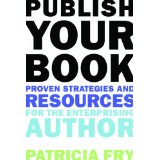What do you need to know about publishing? If you’re an author or plan to become one, you need to know everything you can possibly learn about the publishing industry, your options, the possible consequences of your choices and your responsibilities as a published author. If you want to experience a level of success within this industry, you must know something about it.
Professionals will tell you over and over again how important it is to study the publishing industry before getting involved. You need to know, for example, that books, in order to sell, need exposure—people will not buy a book they don’t know exists.
Believe it or not, some hopeful authors still don’t understand or embrace this truth. I heard from one recently who definitely wanted to land a traditional publisher primarily because he didn’t want to do any promotion. I hope I convinced him that no matter which publishing option he chooses or which publisher he goes with, he is 100 percent responsible for promoting his book.
Sure, some publishers will provide a little help during the first few weeks or months. You can purchase a marketing plan from your “self-publishing” company. But is this enough to launch your book? To recoup your investment? To make a little money? NO!
Most authors are not salespeople, marketing experts, promotional managers. They don’t have a clue as to how to get publicity for their books. But they can learn something about the world of publishing and the much larger aspect of authorship, which is book marketing, by tapping into blogs, books and newsletters produced by credible, knowledgeable professionals. I highly recommend that authors start reading blogs such as this one and that they subscribe to newsletters and other publications and attend writers group meetings and writers/authors conferences. Listen, read and learn.
Publishing/Marketing News and Views is my new bi-monthly e-newsletter for authors at any stage of publishing or marketing their books. Sign up today to receive your copy for insider tips, resources and perspective you won’t find anywhere else. http://www.patriciafry.com
The first newsletter went out this month. If you’d like a copy of it, let me know. The second newsletter will be sent via email in October.
So I invite you to visit this blog often and be sure to sign up to receive my e-newsletter, Publishing/Marketing News and Views by Patricia Fry. http://www.patriciafry.com It’s FREE
While you’re at it, you can download my FREE ebook, 50 Ways to Establish Your Author Platform.
You can never be too well-informed. And with the publishing industry and your marketing options changing by the minute, it is important to keep your finger on the pulse of the industry in constantly. This e-newsletter will help you with that.
